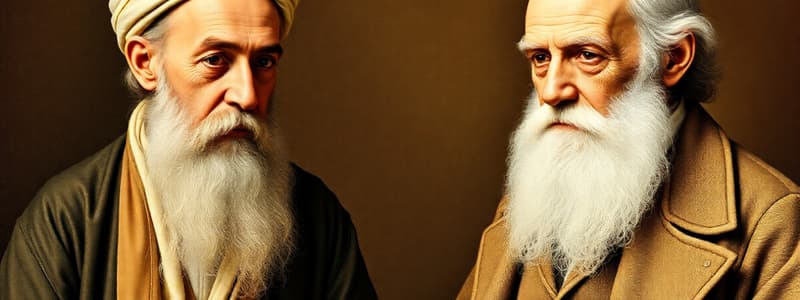Podcast
Questions and Answers
Which field is specifically associated with al-Haytham's discoveries and contributions?
Which field is specifically associated with al-Haytham's discoveries and contributions?
- Medicine
- Optics (correct)
- Mechanics
- Mathematics
Al-Haytham's approach to scientific investigation is similar to which modern concept?
Al-Haytham's approach to scientific investigation is similar to which modern concept?
- The scientific method (correct)
- Empirical observation
- Philosophical debate
- Theoretical modeling
Which historical figures were inspired by al-Haytham's work?
Which historical figures were inspired by al-Haytham's work?
- Thomas Edison and Nikola Tesla
- Aristotle, Plato, and Socrates
- Galileo, Johannes Kepler, and Sir Isaac Newton (correct)
- Charles Darwin and Albert Einstein
What invention is al-Haytham credited with that laid the groundwork for future advancements in photography?
What invention is al-Haytham credited with that laid the groundwork for future advancements in photography?
In what year was al-Haytham recognized as a trailblazer by UNESCO?
In what year was al-Haytham recognized as a trailblazer by UNESCO?
What nickname did Darwin have at the age of 12, and why?
What nickname did Darwin have at the age of 12, and why?
Which event prompted Darwin to publicly reveal his theory of natural selection?
Which event prompted Darwin to publicly reveal his theory of natural selection?
What motivated Darwin to go to great lengths in pursuit of a new specimen?
What motivated Darwin to go to great lengths in pursuit of a new specimen?
What role was Darwin invited to undertake aboard the H.M.S. Beagle?
What role was Darwin invited to undertake aboard the H.M.S. Beagle?
During which period of his life did Darwin's interest in natural specimens intensify?
During which period of his life did Darwin's interest in natural specimens intensify?
Flashcards are hidden until you start studying
Study Notes
Ibn al-Haytham
- Ibn al-Haytham was a polymath born in what is now Iraq, known for his contributions to mathematics, physics, astronomy, philosophy, and medicine.
- He wrote over 200 books during his lifetime and was an expert in Aristotle's philosophy.
- He is credited with discovering the laws of reflection and refraction and inventing the camera obscura.
- This work contributed to his influence on astronomy, mathematics, and optics, inspiring scientists such as Galileo, Kepler, and Newton.
- In 2016, UNESCO celebrated him as a pioneer and the founder of modern optics.
Charles Darwin
- Darwin's interest in science began in childhood, experimenting and collecting natural specimens.
- He was nicknamed "Gas" for his chemistry experiments with his brother.
- Darwin's observations and experiments continued through his formal education, culminating in his graduation from Cambridge in 1831.
- He was invited to be a naturalist on the H.M.S. Beagle, departing in 1831 and returning in 1836.
- During the Beagle's voyage, he collected new plant and animal specimens, studied geology, and made observations that challenged existing scientific paradigms.
- He wrote ten books after On the Origin of Species, including works on animal behavior, orchids, and domestication.
Alfred Russel Wallace
- In June 1858, Darwin received a paper from Alfred Russel Wallace, an English naturalist working in Malaysia, outlining similar ideas about evolution through natural selection.
- Wallace's paper, titled "On the Tendency of Varieties to Depart Indefinitely from the Original Type," prompted Darwin to publish his own theories.
- This led to a joint presentation of their works to the Linnaean Society in 1858.
August Weismann
- Weismann proposed the theory of germ-plasm, which predicted that offspring inherit half their germ-plasm from each parent.
- He also argued that acquired traits could not be inherited.
- His work was a major contribution to understanding genetic inheritance, but a connection between genetics and evolution was still missing.
Gregor Mendel
- Mendel published his work on heredity in 1865, which was groundbreaking in understanding genetic inheritance.
- His work focused on experiments with pea plants.
Studying That Suits You
Use AI to generate personalized quizzes and flashcards to suit your learning preferences.




